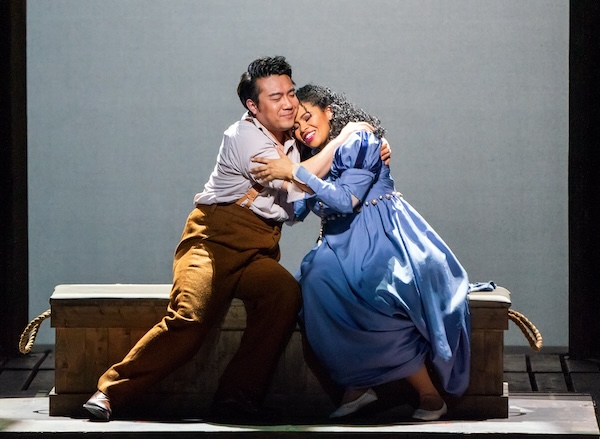Inspired cast makes Dallas Opera’s “Romeo and Juliet” a successful tragedy

Dallas Opera’s production of Charles Gounod’s Romeo and Juliet served up a spectacular season closer in a fresh and idiomatically Gallic staging that saw a significant number of Dallas Opera debuts. The performance was a visual and musical delight.
Friday night’s performance featured a remarkable lineup of singers, with the title roles subtly acted as well.
Long Long, a tenor with a round, earnest tone was Romeo. His garden-scene cavatina “Ah! lève-toi, soleil!” was assured, blooming in his upper range, nicely supported by sensitive clarinet and oboe solos. “Ah! jour de deuil,” sung in response to his exile, was thrown off with robust, passionate energy, displaying another aspect of his range of emotions and characterization.
Soprano Golda Schultz, singing Juliet, lent her sweetly lucent voice to the role. Her “Je veux vivre” was gently acrobatic, with a slightly heavy vibrato overdone. She was aptly moving in her poignant characterization of “Adieu mon amour, adieu ma vie,” while her final death scene was ardently delivered.
The young lovers’ many duets were judiciously balanced, including “O nuit divine,” in the famous balcony scene. Here Long’s tenor was focused and plummy. At the end of the scene, in ”Ah! ne fuis pas encore!” Schultz’s tone shimmered. Her sunny “Va! je t’ai pardonné” led to the charming dawn duet that concludes their wedding night. Both singers effectively portrayed the anguish of their final bittersweet duet “Console-toi, pauvre âme.”
The supporting cast was strong. Friar Laurence was sung by Raymond Aceto, whose lofty resonant bass came across a little too forced for the French style. Baritone Donnie Ray Albert as Lord Capulet was rich and clear, with excellent diction.
Andrew Turner brought his buoyant tenor to the role of Tybalt, while Paris was portrayed by Erik Earl Larson in a penetrating baritone. Mercutio was sung by Eugene Villanueva, whose smooth voice lent the right energy to his bouncy first-act ballade.
Stephano, a pants role, was sung here by soprano Emily Sierra with a winsome touch. Mezzo soprano Claudia Chapa sang the role of Gertrude, Juliet’s nurse, with a warm, woody timbre.
John Conklin’s sets and Gregory Gale’s costumes emphasized a varied spectrum of hues in blue and brown. The unit set consisted of a two-level wooden scaffold bridging across the back with a pair of stairs and a platform stage-left for Juliet’s balcony. In quieter moments the creaking of the wooden bridge was often intrusive.
Director Romain Gilbert started with the back-lit chorus entering to inhabit the stairs and bridge, with a pair of harps at center stage. Singing a syllabic summarization of the plot, the chorus work was crisp.
Ensemble action was consistently well choreographed by Vincent Chaillet and Jeffery Colangelo cleverly staged the fight scene.
Principal guest conductor Nicole Paiement expertly balanced the orchestra with the singers. Harps were audible, percussion (especially timpani) was subtly tasteful. Instrumental highlights include the depiction of night by woodwinds, strings, and harps to open Act 2, and lush low strings which begin the following two acts.
Under Paiement’s direction, the cast sang with the refined weight proper to the romantic French repertoire. Her discreet pacing of the production sealed the success of the evening’s production.
Romeo and Juliet runs through March 9. dallasopera.org